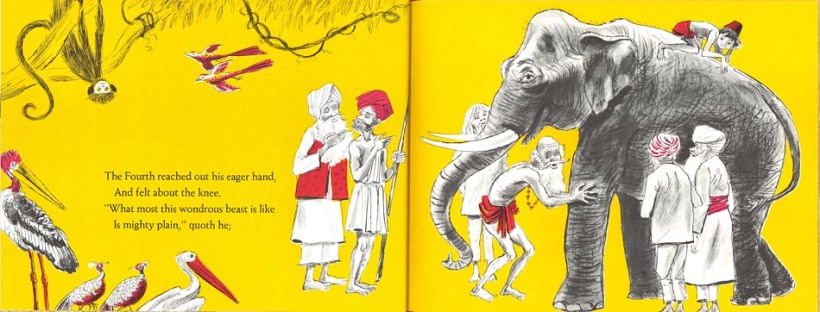By Sally Theobald
An extract from the Rumi poem, “An Elephant in the Dark”:
Each of us touches one place
and understands the whole that way.
The palm and the fingers feeling in the dark
are how the senses explore the reality of the elephant.
To me this illustrates the importance of multidisciplinary approaches – different disciplines illuminate different aspects or bring new ways of seeing or addressing an issue or problem. The complexity and challenges posed by addressing Neglected Tropical Diseases (NTDs) requires multidisciplinary approaches and these are at the heart of COUNTDOWN. Recent COUNTDOWN blogs on the hotspot conundrum have highlighted the importance of applying different disciplines and methods for action here. There is also need to understand context – what works in one place may not work in another – and this too requires different methods and disciplines.
In the Liverpool School of Tropical Medicine, partnerships between parasitology and social science are relatively recent and have been strengthened through the COUNTDOWN consortium. I was fascinated to understand that the Department of Microbiology and Parasitology at the University of Buea has been partnering and fostering links with social scientists for many years. So being a good nosey social scientist I interviewed Prof. Samuel Wandji to understand more … Samuel explained links with social scientists go back to a Tropical Disease Research (TDR) funded project in 2000 on the indicators for Loa loa that required both parasitological and clinical indicators. The clinical indicators required questions about the history of disease, swelling of hands, movement of the worm in the eye and length of time the worm stayed in the person’s eye. These were very difficult questions to discuss and there was need to ensure the concepts and ideas from the interviewer matched those of the interviewee and social scientists were brought in to conduct the interviews. The same methodological approach was also replicated in the Democratic Republic of Congo, with Samuel Wandji playing a key role and again working with social scientists in DRC to collect and analyse data on patient and community experience of Loa loa. In the same spirit of using multidisciplinary approach for health interventions, Samuel and his team partnered on a multi-county project (five African countries) again funded by TDR on community approaches and collaboration with community based drug distributors and community health workers for onchocerciasis, bed nets, malaria, vitamin A and directly observed treatment for tuberculosis. This more complex health intervention required both multidisciplinary partnerships, participatory approaches and ongoing community engagement.
Samuel explained that it was important to engage the entire community throughout the process and that community ownership and support of community based workers was critical to their success and sustainability.
In the Buea’s Department of Microbiology and Parasitology there are now five social scientists, three of whom work on COUNTDOWN and they are part of the “community of life” in the department. Samuel and the department are committed to the sustainability of multi-disciplinary research and students are supported and nurtured in a range of approaches. Samuel explained that he sees himself as a public health parasitologist, and that part of the challenge is understanding how the parasite lives within an organism and sustains itself – this is a complex ecosystem that requires different approaches to understand it. Samuel said “if the question or problem we need to address is not relevant to the community we can’t start the work – we need to be able to have an impact on communities, and this requires partnership with social science at the beginning, throughout and at the end”.
The whole is truly bigger than the sum of the parts accessible to any one health system discipline. In COUNTDOWN we are lucky to partner with Buea’s Department of Microbiology and Parasitology who have strengths and experience in driving forward multidisciplinary research for action for NTDs.
Read more about the work of Buea’s Department of Microbiology and Parasitology
CDI Study Group (2010) Community-directed interventions for priority health problems in Africa: results of a multicountry study.. Bull World Health Organ. 2010 Jul 1;88(7):509-18. doi: 10.2471/BLT.09.069203. Epub 2009 Dec 1. PMID: 20616970
Wanji S, Tendongfor N, Nji T, Esum M, Che JN, Nkwescheu A, Alassa F, Kamnang G, Enyong PA, Taylor MJ, Hoerauf A, Taylor DW (2009) Community-directed delivery of doxycycline for the treatment of onchocerciasis in areas of co-endemicity with loiasis in Cameroon.. Parasit Vectors. 2009 Aug 27;2(1):39. doi: 10.1186/1756-3305-2-39.PMID: 19712455
Wanji S. Rapid Assessment Procedures for Loiasis:Report of a Multi-Centre Study. Geneva: UNDP/Worldbank/WHO Special Programme for Research & Training in Tropical Diseases; 2001.
Read more about the RAPLOA assessment RAPLOA assessment – a real shining light example of a multidisciplinary health system research innovation http://www.who.int/apoc/cdti/raploa/en/
Picture acknowledgement: Illustration from ‘The Blind Men and the Elephant’ appears with the generous permission of The Estate of Paul Galdone

One thought on “Fostering multidisciplinary partnerships: Illuminating the “elephant in the dark””